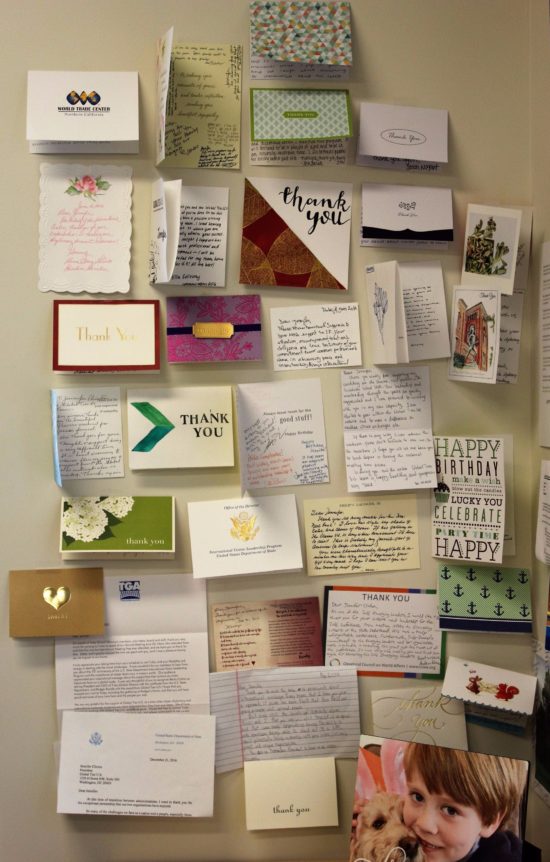By Jennifer Clinton, PhD, President, Global Ties U.S.

Every morning, I walk into my office to what I call my gratitude wall. Next to the photo of my son, it is the element I am most proud of in my work space.
My gratitude wall consists of dozens of cards and letters that people have sent me to express their appreciation for ways that I have helped them or made a difference in their lives. It gives meaning to my work and reminds me of how important it is to express appreciation to others.
It’s no surprise that this messy wall is my favorite spot in my office, as dozens of scientific studies have proven that there are health benefits from gratitude. According to a recent Newsweek article, a psychologist from the University of Birmingham noted in 2013 that the “list of potential benefits is almost endless: fewer intellectual biases, more effective learning strategies, more helpfulness towards others, raised self-confidence, better work attitude, strengthened resiliency, less physical pain, improved health and longevity.” If that is the impact that gratitude can have on an individual’s health, imagine the impact it can have on an organization that fully embraces an attitude of gratitude.
As nonprofit professionals, we are always in search of the magic bullet that will deliver our organizations to long-term sustainability through increased support and engagement from our staff, board, partners, volunteers and donors. Perhaps the answer, or one of the answers, is right in front of us.
Robert Emmons, a professor of psychology at the University of California, Davis, has become the world’s leading scientific expert on gratitude. Emmons argues that “thankfulness is important not only because it helps people feel good, but also because it encourages them to do good.” In other words, the more gratitude we express to staff, supporters, partners and volunteers, the more they will be motivated to work hard to support the organization.
The question for us is: how do we institutionalize and sustain a commitment to gratitude as a pervasive value in our organization and Network? I don’t have all of the answers, nor am I an expert at this, but after studying this topic in more detail, I have a few suggestions. The first step would be to model behavior that you want to see reflected by your staff and volunteers. Making it a habit to start any conversation by acknowledging and appreciating your colleagues. Take time out to publicly recognize individuals for their contributions through awards programs and public displays of appreciation. Take the extra time to show appreciation through hand-written notes. Personalize your communications to say specifically how an individual’s contribution has made a difference in your work and mission. Ask for feedback on how individuals would like to be recognized. Highlight stories of people who go above and beyond and note what difference it made. Don’t stop thanking people. Start and end emails with a thank you.
As we near the midpoint of the year, I encourage you to pause, think and show your gratitude – to your team, friends, family, supporters – everyone that makes your work, life and organization successful. Thank them for all they have done to date and encourage them to keep up the good fight, their hard work and support for the remainder of the year. As a Network we have a tremendous amount to be thankful for. Reinforcing the things we are grateful for will only attract more good things to come our way. I’d love to hear your strategies in expressing gratitude for your supporters, volunteers, staff and partners. We’d be happy to share these best practices across the Network so we can increase our overall GQ (gratitude quotient)!
As you read this edition of ExchangeMatters, I invite and challenge you to reflect on how you can develop this attitude of gratitude at work, home and in your community. I firmly believe that being intentional about showing our appreciation constantly will make us all stronger and better – as individuals, non-profit leaders and members of our society.
Follow the link to read more on ways to integrate gratitude into your life and workplace, or watch Robert Emmons’ TED Talk.
